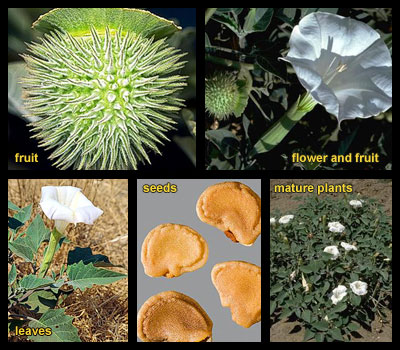Datura – Plant Poison
Datura is an alkaloid containing plant from the Nightshade Family, Solanaceae. These are Deliriants plant poisons. Datura plants in India are abundant and grow wild all over the country. The common name of datura is thorn apple, stinkweed, angel’s trumpet, and Jamestown weed. All parts of plants are poisonous, but seed and fruits are more toxic in nature. All fruits of the datura plant are spherical and have sharp spines. They contain brown seeds resembling chillies seeds. The fruit is also called thorn apple.
There are three chemicals produced naturally by Datura plants: hyoscyamine, atropine, and scopolamine.
Effects of Datura
- Dryness of mouth and throat
- Difficulty in talking
- Dilatation of pupils
- Dry hot skin
- High blood pressure
- Hallucinations, Especially olfactory and tactile
- Anxiety, Depression, Fatigue, Delirium, Amnesia and Vision issues.
Analysis
Chemical Test
Vitalis Test – Sample + 2-3 drops of acetic acid and evaporated. Then add 1 drop of fuming HNO3 to Dry residue and again evaporate till it gets dry. After cooling, add 1 drop of alcoholic caustic potash solution and violet colour appears immediately and changes into red and then colour disappears.
Confirmatory test
- Thin layer chromatography
- UV and IR Absorption spectra
- Gas chromatography
- Microscopical analysis – The fragments of seed of datura are extracted from vomit or stomach and seen under a microscope.


Can we use another acid instead of acetic acid for Vitalis Test?
No because acetic acid complete precipitation of sulphur in the form of lead sulphate occurs due to common ion effect. Hence, it is necessary to use acetic acid for acidification of sodium extract for testing sulphur by lead acetate test.